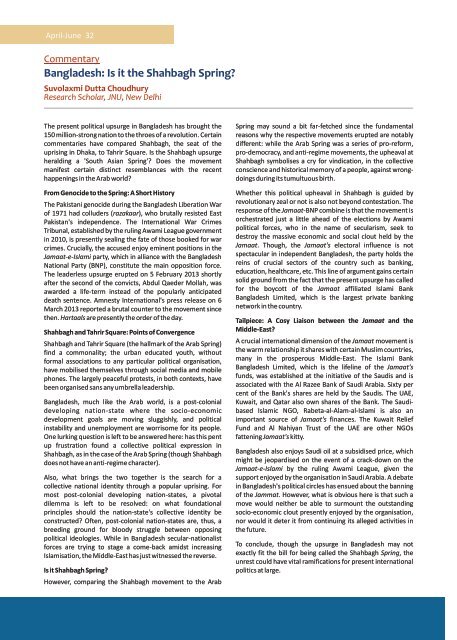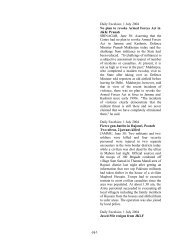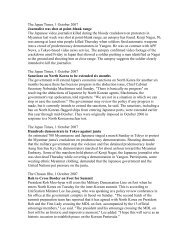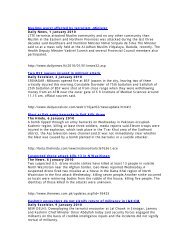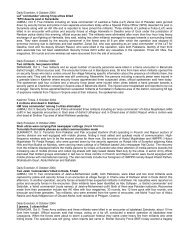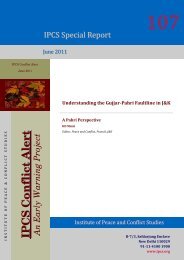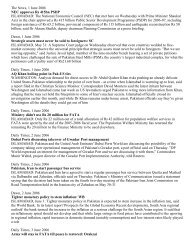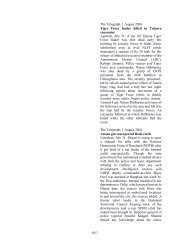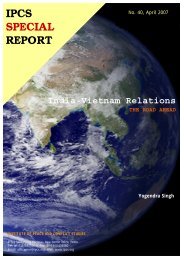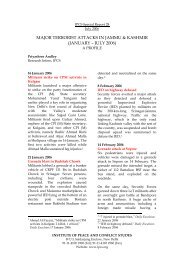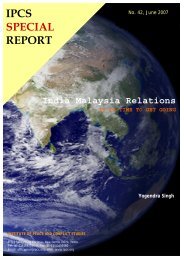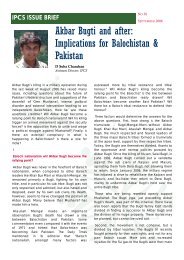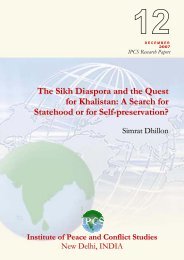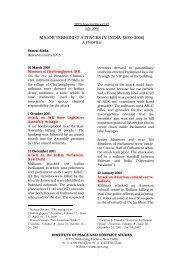April-June 2013 - Institute of Peace and Conflict Studies
April-June 2013 - Institute of Peace and Conflict Studies
April-June 2013 - Institute of Peace and Conflict Studies
Create successful ePaper yourself
Turn your PDF publications into a flip-book with our unique Google optimized e-Paper software.
<strong>April</strong>-<strong>June</strong> 32<br />
Commentary<br />
Bangladesh: Is it the Shahbagh Spring?<br />
Suvolaxmi Dutta Choudhury<br />
Research Scholar, JNU, New Delhi<br />
The present political upsurge in Bangladesh has brought the<br />
150 million-strong nation to the throes <strong>of</strong> a revolution. Certain<br />
commentaries have compared Shahbagh, the seat <strong>of</strong> the<br />
uprising in Dhaka, to Tahrir Square. Is the Shahbagh upsurge<br />
heralding a 'South Asian Spring'? Does the movement<br />
manifest certain distinct resemblances with the recent<br />
happenings in the Arab world?<br />
From Genocide to the Spring: A Short History<br />
The Pakistani genocide during the Bangladesh Liberation War<br />
<strong>of</strong> 1971 had colluders (razakaar), who brutally resisted East<br />
Pakistan's independence. The International War Crimes<br />
Tribunal, established by the ruling Awami League government<br />
in 2010, is presently sealing the fate <strong>of</strong> those booked for war<br />
crimes. Crucially, the accused enjoy eminent positions in the<br />
Jamaat-e-Islami party, which in alliance with the Bangladesh<br />
National Party (BNP), constitute the main opposition force.<br />
The leaderless upsurge erupted on 5 February <strong>2013</strong> shortly<br />
after the second <strong>of</strong> the convicts, Abdul Qaeder Mollah, was<br />
awarded a life-term instead <strong>of</strong> the popularly anticipated<br />
death sentence. Amnesty International's press release on 6<br />
March <strong>2013</strong> reported a brutal counter to the movement since<br />
then. Hartaals are presently the order <strong>of</strong> the day.<br />
Shahbagh <strong>and</strong> Tahrir Square: Points <strong>of</strong> Convergence<br />
Shahbagh <strong>and</strong> Tahrir Square (the hallmark <strong>of</strong> the Arab Spring)<br />
find a commonality; the urban educated youth, without<br />
formal associations to any particular political organisation,<br />
have mobilised themselves through social media <strong>and</strong> mobile<br />
phones. The largely peaceful protests, in both contexts, have<br />
been organised sans any umbrella leadership.<br />
Bangladesh, much like the Arab world, is a post-colonial<br />
developing nation-state where the socio-economic<br />
development goals are moving sluggishly, <strong>and</strong> political<br />
instability <strong>and</strong> unemployment are worrisome for its people.<br />
One lurking question is left to be answered here: has this pent<br />
up frustration found a collective political expression in<br />
Shahbagh, as in the case <strong>of</strong> the Arab Spring (though Shahbagh<br />
does not have an anti-regime character).<br />
Also, what brings the two together is the search for a<br />
collective national identity through a popular uprising. For<br />
most post-colonial developing nation-states, a pivotal<br />
dilemma is left to be resolved: on what foundational<br />
principles should the nation-state's collective identity be<br />
constructed? Often, post-colonial nation-states are, thus, a<br />
breeding ground for bloody struggle between opposing<br />
political ideologies. While in Bangladesh secular-nationalist<br />
forces are trying to stage a come-back amidst increasing<br />
Islamisation, the Middle-East has just witnessed the reverse.<br />
Is it Shahbagh Spring?<br />
However, comparing the Shahbagh movement to the Arab<br />
Spring may sound a bit far-fetched since the fundamental<br />
reasons why the respective movements erupted are notably<br />
different: while the Arab Spring was a series <strong>of</strong> pro-reform,<br />
pro-democracy, <strong>and</strong> anti-regime movements, the upheaval at<br />
Shahbagh symbolises a cry for vindication, in the collective<br />
conscience <strong>and</strong> historical memory <strong>of</strong> a people, against wrongdoings<br />
during its tumultuous birth.<br />
Whether this political upheaval in Shahbagh is guided by<br />
revolutionary zeal or not is also not beyond contestation. The<br />
response <strong>of</strong> the Jamaat-BNP combine is that the movement is<br />
orchestrated just a little ahead <strong>of</strong> the elections by Awami<br />
political forces, who in the name <strong>of</strong> secularism, seek to<br />
destroy the massive economic <strong>and</strong> social clout held by the<br />
Jamaat. Though, the Jamaat's electoral influence is not<br />
spectacular in independent Bangladesh, the party holds the<br />
reins <strong>of</strong> crucial sectors <strong>of</strong> the country such as banking,<br />
education, healthcare, etc. This line <strong>of</strong> argument gains certain<br />
solid ground from the fact that the present upsurge has called<br />
for the boycott <strong>of</strong> the Jamaat affiliated Islami Bank<br />
Bangladesh Limited, which is the largest private banking<br />
network in the country.<br />
Tailpiece: A Cosy Liaison between the Jamaat <strong>and</strong> the<br />
Middle-East?<br />
A crucial international dimension <strong>of</strong> the Jamaat movement is<br />
the warm relationship it shares with certain Muslim countries,<br />
many in the prosperous Middle-East. The Islami Bank<br />
Bangladesh Limited, which is the lifeline <strong>of</strong> the Jamaat's<br />
funds, was established at the initiative <strong>of</strong> the Saudis <strong>and</strong> is<br />
associated with the Al Razee Bank <strong>of</strong> Saudi Arabia. Sixty per<br />
cent <strong>of</strong> the Bank's shares are held by the Saudis. The UAE,<br />
Kuwait, <strong>and</strong> Qatar also own shares <strong>of</strong> the Bank. The Saudibased<br />
Islamic NGO, Rabeta-al-Alam-al-Islami is also an<br />
important source <strong>of</strong> Jamaat's finances. The Kuwait Relief<br />
Fund <strong>and</strong> Al Nahiyan Trust <strong>of</strong> the UAE are other NGOs<br />
fattening Jamaat's kitty.<br />
Bangladesh also enjoys Saudi oil at a subsidised price, which<br />
might be jeopardised on the event <strong>of</strong> a crack-down on the<br />
Jamaat-e-Islami by the ruling Awami League, given the<br />
support enjoyed by the organisation in Saudi Arabia. A debate<br />
in Bangladesh's political circles has ensued about the banning<br />
<strong>of</strong> the Jammat. However, what is obvious here is that such a<br />
move would neither be able to surmount the outst<strong>and</strong>ing<br />
socio-economic clout presently enjoyed by the organisation,<br />
nor would it deter it from continuing its alleged activities in<br />
the future.<br />
To conclude, though the upsurge in Bangladesh may not<br />
exactly fit the bill for being called the Shahbagh Spring, the<br />
unrest could have vital ramifications for present international<br />
politics at large.


